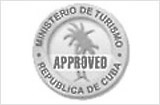CUBAN LEGAL SYSTEM
The Supreme Court of Cuba serves as the nation's highest judicial branch of government.
Cuban courts are organized into three tiers that match the governmental divisions (national or Supreme Court, provincial, and municipal). Most civil and criminal cases tried at the municipal and provincial levels are adjudicated by a panel of two lay judges and one professional judge. Cases that involve a potential sentence longer than eight years or complex civil law issues are heard, at the provincial or supreme level, by a panel of three professional judges and two lay judges. Both professional and lay judges are elected to their positions by the legislative assembly.
Lay judges are peasants, workers, professionals, housewives, university students, who form the judicial panels along with the professional judges. They have the same rights to make decisions on the cases that are submitted to the courts. They serve for 30-day terms.
Under Cuban law, all judges are required to be independent in their judgment and are subject only to the law.
US Cuba Legal Travel
In terms of visiting Cuba, legal travel from the USA has been all but impossible for over half a century.
Right now, however, a rare alteration in travel regulations made by former US President Barack Obama offers US citizens the opportunity to go to Cuba under the General License for Educational Activities, Support for the Cuban People, Professional Research, among others.
After the publication of the new updates to the Cuban Assets Control Regulations (31 CFR Part 515) on February 6, 2025, and July 14, 2025, all 12 categories of legal Cuba travel remain unaffected; except for the Individual People-to-people General License for Cuba travel which has been ended (the Group People-to-people General License) has been re-authorized though.
The future of travel from the US to Cuba is uncertain, and right now, US travelers still have the chance to go to Cuba legally for Professional Research, Support for the Cuban People, Professional Meetings, Religious Activities, and other venues.
Cuba Themed Tours
If you’ve got an idea of which style of trip will suit you best, take a look at our different trip themes below, as there’s something to suit everyone. Not only are there themed tours to fit any budget and interest, each Authentic Cuba Travel® experience immerses you in the authentic Cuba so hard to explore while just staying in full packed beach resorts.
Festival Tours
Our festival tours give travelers VIP access to all venues and happenings of Cuba’s famous international events such as the Havana Jazz Festival, Book Fair, Ballet Festival and others.
Study Tours
Through peer to peer interaction, our Cuba Study Tours® transcend ordinary tourism by immersing American students in the local culture, history, politics, music and contemporary arts.
Cultural Tours
Cuba Pathfinder® is your gateway to discover the unique Cuban cultural heritage, a set of traditions & memories not showcased in museums but much alive & thriving.
Architecture Tours
An architectural passage through Cuba’s best preserved colonial cities and unique architectural heritage, our architecture tours visit all UNESCO World Heritage Sites in Cuba.
Photography Tours
Capturing stirring pictures of authentic Cuban destinations it is not the only mission of our photography tours. Capture the essence of the Cuban culture and the kindness of its people.
Educational Tours
Our educational tours represents a great opportunity for K-12 teachers, university & college professors to explore Cuba’s education system while exploring colonial cities, towns and villages.
Nature Tours
An odyssey into Cuba's tropical paradise, our nature & bird watching tours gain access to the most pristine natural sites, from UNESCO Biosphere Reserves to National Parks.
Jewish Tours
A journey into the Jewish history in Cuba, our tours will strengthen the ties between Cuban Jewish communities and North American Jews. All while visiting 4 UNESCO World Heritage Sites!
Sports Tours
What sets our sports tours apart are the private exchanges with players, coaches & staff as well as sports journalists & personalities. Then you have best seats at the games!
CUBA TOUR FINDER
Select your authentic Cuba trip from over 70 Cuba tours in seconds. Sort by departure date, price, destination and even Cuba travel theme.
QUICK CUBA TOUR FINDERList of Cuba Tours 2026
-
Tour Name
Tour Dates
Cost
-
Cuba Al Natural
Havana, Zapata, Trinidad
Mar 7- Mar 18, 2026
$2,859 Book Now
-
Cuba Business Tour 1
Havana, Matanzas, Varadero
Mar 7- Mar 14, 2026
$2,599 Book Now
-
Healthcare Cuba Tour 1
Havana, Cienfuegos, Trinidad
Mar 7- Mar 14, 2026
$2,599 Book Now
-
Real Cuba Tour 3
Havana, Las Terrazas, Vinales
Mar 7- Mar 14, 2026
$2,599 Book Now
-
Cuba Engage Tour 3
Havana, Bay of Pigs, Trinidad
Mar 7- Mar 14, 2026
$2,599 Book Now
-
Cuba Art Explorer I
Havana, Vinales
Mar 7- Mar 14, 2026
$2,599 Book Now
-
Bird Watching Tour
Havana, Zapata, Trinidad
Mar 7- Mar 14, 2026
$2,599 Book Now
-
Cuba Education Tour 3
Havana, Cienfuegos, Trinidad
Mar 7- Mar 14, 2026
$2,599 Book Now
-
Cuba Education Tour 4
Havana, Vinales
Mar 14- Mar 21, 2026
$2,599 Book Now
-
Photography Tour I
Havana, Vinales, Trinidad
Apr 4- Apr 11, 2026
$2,629 Book Now
-
The Nature of Cuba
Havana, Vinales, Trinidad
Apr 4- Apr 13, 2026
$2,799 Book Now
-
Real Cuba Tour 4
Havana, Las Terrazas, Vinales
Apr 4- Apr 11, 2026
$2,599 Book Now
-
Cuba Engage Tour 4
Havana, Bay of Pigs, Trinidad
Apr 4- Apr 11, 2026
$2,599 Book Now
-
4 Biosphere Reserves
Rosario, Zapata, Buenavista
May 1- May 10, 2026
$2,999 Book Now
-
Real Cuba Tour 5
Havana, Las Terrazas, Vinales
May 9- May 16, 2026
$2,599 Book Now
-
Cuba Engage Tour 5
Havana, Bay of Pigs, Trinidad
May 9- May 16, 2026
$2,599 Book Now
-
Photography Tour II
Havana, Vinales, Trinidad
Jun 6- Jun 13, 2026
$2,629 Book Now
-
Cuba Art Explorer II
Havana, Cienfuegos, Trinidad
Jun 6- Jun 13, 2026
$2,599 Book Now
-
Cuba Education Tour 5
Havana, Cienfuegos, Trinidad
Jun 6- Jun 13, 2026
$2,599 Book Now
-
Real Cuba Tour 6
Havana, Las Terrazas, Vinales
Jun 6- Jun 13, 2026
$2,599 Book Now
-
Cuba Engage Tour 6
Havana, Bay of Pigs, Trinidad
Jun 6- Jun 13, 2026
$2,599 Book Now
-
Cuba Fire Festival
Havana, Santiago de Cuba
Jul 2- Jul 9, 2026
$2,799 Book Now
-
Real Cuba Tour 7
Havana, Las Terrazas, Vinales
Jul 4- Jul 11, 2026
$2,599 Book Now
-
Cuba Engage Tour 7
Havana, Bay of Pigs, Trinidad
Jul 4- Jul 11, 2026
$2,599 Book Now
-
Cuba Business Tour 2
Havana, Matanzas, Varadero
Jul 4- Jul 11, 2026
$2,599 Book Now
-
Healthcare Cuba Tour 2
Havana, Cienfuegos, Trinidad
Jul 4- Jul 11, 2026
$2,599 Book Now
-
Cuba Education Tour 6
Havana, Santiago de Cuba
Jul 4- Jul 11, 2026
$2,799 Book Now
-
Cuba Education Tour 7
Havana, Las Terrazas & Vinales
Jul 11- Jul 18, 2026
$2,599 Book Now
-
Jews of Cuba Travel
Havana, Santa Clara, Cienfuegos
Aug 6- Aug 13, 2026
$2,799 Book Now
-
Real Cuba Tour 8
Havana, Las Terrazas, Vinales
Aug 8- Aug 15, 2026
$2,599 Book Now
-
Cuba Engage Tour 8
Havana, Bay of Pigs, Trinidad
Aug 8- Aug 15, 2026
$2,599 Book Now
-
Photography Tour III
Havana, Vinales, Trinidad
Aug 8- Aug 15, 2026
$2,629 Book Now
-
Cuba Education Tour 8
Havana, Cienfuegos, Trinidad
Aug 8- Aug 15, 2026
$2,599 Book Now
-
Cuba Art Explorer III
Havana, Vinales
Aug 8- Aug 15, 2026
$2,599 Book Now
-
Cuba Legal Travel
Havana, Vinales
Aug 8- Aug 15, 2026
$2,799 Book Now
-
Cuba Architecture I
Havana, Cienfuegos, Trinidad
Aug 8- Aug 15, 2026
$2,599 Book Now
-
Seven Cities II
Havana, Santiago de Cuba
Aug 8- Aug 19, 2026
$3,329 Book Now
-
Real Cuba Tour 9
Havana, Las Terrazas, Vinales
Sep 5- Sep 12, 2026
$2,599 Book Now
-
Cuba Engage Tour 9
Havana, Bay of Pigs, Trinidad
Sep 5- Sep 12, 2026
$2,599 Book Now
-
Baseball Tour
Havana, Cienfuegos, Trinidad
Sep 5- Sep 12, 2026
$2,999 Book Now
-
African Heritage
Havana, Las Terrazas, Vinales
Oct 3- Oct 9, 2026
$2,699 Book Now
-
Real Cuba Tour 10
Havana, Las Terrazas, Vinales
Oct 3- Oct 10, 2026
$2,599 Book Now
-
Cuba Engage Tour 10
Havana, Bay of Pigs, Trinidad
Oct 3- Oct 10, 2026
$2,599 Book Now
-
Dance Cuba Tour
Havana, Las Terrazas
Oct 3- Oct 10, 2026
$2,599 Book Now
-
Performing Arts Tour
Havana, Cienfuegos, Trinidad
Oct 3- Oct 10, 2026
$2,599 Book Now
-
Cuba Ballet Festival
Havana, Vinales
Oct 31- Nov 7, 2026
$2,999 Book Now
-
Jo Jazz Havana
Havana, Las Terrazas, Vinales
Nov 4- Nov 11, 2026
$2,799 Book Now
-
Seven Cities I
Havana, Santiago de Cuba
Nov 5- Nov 16, 2026
$3,329 Book Now
-
Cuba Nature Tour
Havana, Vinales, Trinidad
Nov 6- Nov 15, 2026
$2,799 Book Now
-
Art & Fashion Festival
Havana, Cienfuegos, Trinidad
Nov 6- Nov 13, 2026
$2,699 Book Now
-
Real Cuba Tour 11
Havana, Las Terrazas, Vinales
Nov 7- Nov 14, 2026
$2,599 Book Now
-
Cuba Engage Tour 11
Havana, Bay of Pigs, Trinidad
Nov 7- Nov 14, 2026
$2,599 Book Now
-
Cuba Business Tour 3
Havana, Matanzas, Varadero
Nov 7- Nov 14, 2026
$2,599 Book Now
-
Healthcare Cuba Tour 3
Havana, Cienfuegos, Trinidad
Nov 7- Nov 14, 2026
$2,599 Book Now
-
Havana Film Festival
Havana, Vinales
Dec 7- Dec 14, 2026
$2,899 Book Now
-
Real Cuba Tour 12
Havana, Las Terrazas, Vinales
Dec 26- Jan 2, 2027
$2,799 Book Now
-
Cuba Engage Tour 12
Havana, Bay of Pigs, Trinidad
Dec 26- Jan 2, 2027
$2,799 Book Now
-
Cuba Education Tour 9
Havana, Cienfuegos, Trinidad
Dec 26- Jan 2, 2027
$2,599 Book Now
-
Cuba Education Tour 10
Havana, Bay of Pigs, Santa Clara
Dec 26- Jan 2, 2027
$2,599 Book Now
-
Cuba Education Tour 11
Havana, Santiago de Cuba
Dec 26- Jan 2, 2027
$2,799 Book Now
-
Bird Watching Tour
Havana, Zapata, Trinidad
Dec 26- Jan 2, 2027
$2,599 Book Now
-
Cuba Architecture II
Havana, Cienfuegos, Trinidad
Dec 26- Jan 2, 2027
$2,799 Book Now
-
Cuba Art Explorer IV
Havana, Las Terrazas
Dec 26- Jan 2, 2027
$2,799 Book Now
-
Photography Tour IV
Havana, Vinales, Trinidad
Dec 26- Jan 2, 2027
$2,729 Book Now
-
Jewish Heritage Tour
Havana, Cienfuegos, Trinidad
Dec 26- Jan 2, 2027
$2,899 Book Now
-
Family Discovery Tour
Havana, Cienfuegos, Trinidad
Dec 26- Jan 2, 2027
$2,699 Book Now
-
Real Cuba Tour 1
Havana, Las Terrazas, Vinales
Jan 9- Jan 16, 2027
$2,599 Book Now
-
Cuba Engage Tour 1
Havana, Bay of Pigs, Trinidad
Jan 9- Jan 16, 2027
$2,599 Book Now
-
Havana Art Biennial
Havana, Vinales
Dec 11- Dec 18, 2027
$2,799 Book Now
-
Cuba Jazz Festival
Havana, Cienfuegos, Trinidad
Jan 24- Feb 1, 2027
$3,099 Book Now
-
Santiago Jazz Festival
Santiago de Cuba
Jan 24- Jan 31, 2027
$2,899 Book Now
-
Havana Jazz Festival
Havana, Vinales
Jan 27- Feb 1, 2027
$2,499 Book Now
-
Havana Book Fair
Havana, Cienfuegos, Trinidad
Feb 12- Feb 19, 2027
$2,799 Book Now
-
Real Cuba Tour 2
Havana, Las Terrazas, Vinales
Feb 6- Feb 13, 2027
$2,599 Book Now
-
Cuba Engage Tour 2
Havana, Bay of Pigs, Trinidad
Feb 6- Feb 13, 2027
$2,599 Book Now
-
Habano Cigar Festival
Havana, Vinales
Feb 20- Feb 27, 2027
$8,999 Book Now
-
Cuba Education Tour 1
Havana, Cienfuegos, Trinidad
Feb 20- Feb 27, 2027
$2,599 Book Now
-
Cuba Education Tour 2
Havana, Cienfuegos, Trinidad
Feb 27- Mar 6, 2027
$2,599 Book Now
SUBSCRIBE
Sign up for email updates from Authentic Cuba Travel®. Our monthly newsletters are full of information on Cuba Study Tours®, Cuba Education Tours, Cuba Cultural Tours, Cuba Architecture Travel, Cuba Festival Travel, Cuba Nature & Bird Watching Travel & Sport Tours. Free Familiarization (FAM) Cuba Tours for educators. Get discounts from Authentic Cuba Travel®!
NewsletterMemberships & Affiliations
Bella Travel Group Ltd. (Federal Corporation number: 765324-7) owns and operates the following registered trademarks: Authentic Cuba Travel® is a trademark registered at the Canadian Intellectual Property Office (CIPO), Registration No. TMA975677 | Cuba Pathfinder® is a trademark registered at the Canadian Intellectual Property Office (CIPO), Registration No. TMA997988 | Cuba Pathfinder® is a trademark registered at the United States Patent and Trademark Office (USPTO), Registration No. 5498353 | Cuba Study Tours, Make Cuba Your Classroom® is a trademark registered at the United States Patent and Trademark Office (USPTO), Registration No. 5833051.

 1-877-280-2054 (North America)
1-877-280-2054 (North America) 647-351-8191
(Worldwide)
647-351-8191
(Worldwide)
 647-351-8191
(Worldwide)
647-351-8191
(Worldwide)
















